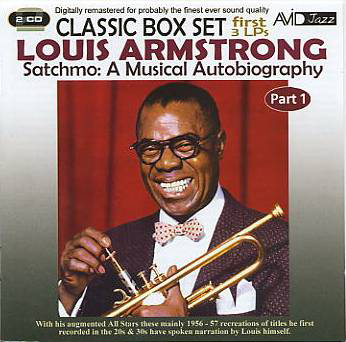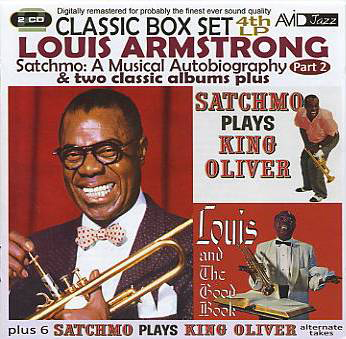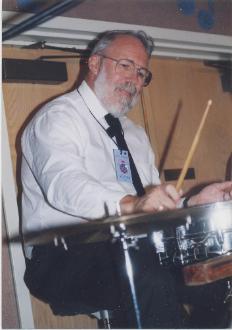|
|
 |
|
|
|
LOUIS ARMSTRONG – Satchmo: A Musical Autobiography, part one (Avid
Jazz AMSC1082)
CD One
Dippermouth Blues; Canal Street Blues; High Society; All the Wrongs You’ve Done to
Me; Everybody Loves My Baby; Make Up Your Mind; See See Rider; Reckless Blues;
Court House Blues; Trouble in Mind; New Orleans Function; Gut Bucket Blues; Cornet
Chop Suey; Heebie Jeebies; Georgia Grind
CD Two
Potato Head Blues; Weary Blues; Gully Low Blues; Struttin’ with Some Barbecue; Hotter
Than That; Two Deuces; My Monday Date; Basin Street Blues; Knockin’ a Jug; Can’t
Give You Anything but Love; Mahogany Hall Stomp; Some of These Days; When You’re
Smiling; Song of the Islands; I Can’t Believe That You’re in Love with Me; Dear Old
Southland (duet Armstrong and Kyle); Exactly Like You.
Louis Armstrong and the All Stars:
Louis Armstrong, tpt, voc*, narrates introduction to each track; Trummy Young, tbn;
Edmond Hall, cl; Billy Kyle, pno; Squire Gersh, sb; Barrett Deems, drs; Velma
Middleton, voc†.
Collective Added or Replacement Personnel on various tracks:
Yank Lawson, tpt; George Barnes, gtr; Jack Teagarden, tbn; Barney Bigard , cl; Earl
Hines, pno; Arvell Shaw, sb; Cozy Cole, drs; Hilton Jefferson, as; George Dorsey, as; fl;
Seldon Powell, ts; Dave McRae, bs, bcl; Everett Barksdale, gtr; Lucky Thompson, ts;
Kenny John, drs; Bud Freeman, ts.
Recorded in sessions at various locations between Nov. 11, 1947 and Jan. 28, 1957.
This double disc contains the contents of the first three LP’s of the original four-
LP set Satchmo: A Musical Autobiography. (The fourth LP of that set is
contained in Part 2 on Avid AMSC 1083, which is filled out with two other
Armstrong LP collections: Satchmo Plays King Oliver and Louis and the Good
Book. Note: the whole four-LP set was also issued as a three-CD box set by
Verve in 2001.) The remastering of the tracks from these LP’s by David Bennett
is superb.
Introducing each of the numbers, Armstrong provides some interesting
anecdotes about his early encounters with and recordings of these numbers,
accompanied by Billy Kyles’ overdubbed piano background. While
Armstrong’s introductions lack the poetry of Jelly Roll Morton’s similar effort
on the Library of Congress recordings, they are warm and personal, giving us
the feeling that Armstrong is simply sitting down with us and sharing some
reminiscences. What follows are fine renditions of great arrangements, those of
the small group recreations coming from bassist Bob Haggart and those of the
big band ones from Sy Oliver.
While New Orleans Function is the 1947 recording by the early All Stars, the
remainder are not note-for-note recreations of the originals, especially, of
course, those that are associated with the Hot Five and Seven, such as Cornet
Chop Suey, Heebie Jeebies, Muskrat Ramble, and King of the Zulus. The last
named is an odd tune by Lil Hardin (Armstrong), but one that resonated
deeply with Armstrong, as his spoken introduction shows, marking for him as
it did an auspicious moment in his life when he presided at the 1949 Mardi
Gras Parade in New Orleans as the King of the Zulu Krewe. All of the tunes on
this set are unmistakably Armstrong, however, and preserve the spirit of the
originals. The opening Dippermouth Blues, giving a nod to King Oliver with
whom Armstrong appeared in Chicago, Yank Lawson taking the place of
Oliver, establishes that immediately. Armstrong is clearly in charge, nicely
dovetailing harmonically in a duet with Lawson, preserving the original breaks
behind the clarinet but then altering them just slightly from the originals when
moving into the coda, effortlessly sending out a stream of upper register notes
there—a vintage Armstrong signature. This same ensemble is found on Canal
Street Blues and Snag It.
The other titles on the first disc and the first several on the second are played
by various configurations of the All Stars, many of them augmented by George
Barnes on guitar. (I must confess, however, that I am not enamored of his using
the electric guitar, particularly where it stands out on his solo on Gut Bucket
Blues, Weary Blues. and elsewhere. I cannot see how it is superior to the
acoustic guitar, properly miked perhaps, as it is on Knockin’ a Jug on the
second CD, for instance.)
Armstrong’s vocals are so familiar that nothing needs be said, but Velma
Middleton is another case. She has a pleasant enough voice with a well-
controlled vibrato, but she is not much a blues singer—certainly no Ma Rainey
or Bessie Smith or any of the other Smiths. Unlike them, she does not sink her
teeth into the songs and worry the meaning out of them. Rather than singing
the blues, she sings about them. Armstrong was not of the same opinion, of
course, and fiercely defended her whenever she received adverse criticism.
The second disc opens with several All Star tracks. Among the highlights for
me were the nicely harmonized breaks on Potato Head Blues; Gully Low Blues
starting out like Do What Ory Say and then dropping beautifully into half time
led by the clarinet after a solo intro; Two Deuces—another tune with
alternating tempos—surprising and delighting with a pyramid ending.
On the last several cuts on the second disc, the All Star group is augmented by
additional players, mainly reeds, and thus resembles the big band Armstrong
fronted in the thirties and forties prior to the advent of the All Star format.
On When You’re Smilin’—taken at a mournfully slow tempo—Armstrong’s
backing has the sound of a “sweet” band, somewhat like that of Guy
Lombardo, whose Royal Canadians were held in high regard by Armstrong.
Much the same can be said of the treatment given Song of the Islands—a tune
which is a reminder of how popular Hawaiian music was in the thirties and
forties.
Standing somewhat apart from all of the other cuts in this two-disc set is Dear
Old Southland, a piano/trumpet duet which has interposed strains from
Sometimes I Feel like a Motherless Child and Summertime before the
outchorus that is taken at double time, then ritarded at the close. It seems to
voice the nostalgic attraction, perhaps romanticized, that the early part of his
life had for Armstrong. Despite his spending the bulk of his life outside of the
American South, he never quite severed his emotional connection with the
South.
For a number of years Armstrong suffered a devaluation at the hands of many
critics, being accused of having deserted jazz and sold out to commercial
interests. Almost single handedly, Ricky Riccardi, the archivist for the Louis
Armstrong House Museum in Queens, New York, has fought—with some
success, I believe—to counter that denigration, and it is he who wrote the
excellent liner notes for this collection. Perhaps, as he says, this reissue of what
he calls “one of the great landmarks of Louis Armstrong’s massive
discography” will receive “the full amount of respect it deserves” this time and
add yet another tier to Satchmo’s reputation.
While Avid is an English label, the last time I checked this set was available on
the Amazon and eBay web sites in the U.S., as well as Avid’s own web site
<http://www.avidgroup.co.uk/>.
|
|
|
|
 |
|
|
|
LOUIS ARMSTRONG – Satchmo: A Musical Autobiography, part two, + Louis
And the Good Book & Satchmo Plays King Oliver (Avid Jazz AMSC1083)
CD One - Satchmo: A Musical Autobiography, part two
If I Could Be with You; Body and Soul; Memories of You; You Rascal, You; When It’s
Sleepy Time Down South; I Surrender, Dear; Them There Eyes; Lazy River; Georgia on
My Mind; That’s My Home; Hobo, You Can’t Ride This Train; On the Sunny Side of the
Street.
Satchmo Plays King Oliver (alternate takes)
St. James Infirmary; I Want a Big Butter and Egg Man; I Ain’t Got Nobody; Panama; Dr.
Jazz; Hot Time in the Old Town Tonight.
Louis and the Good Book
This Train.
CD Two - Louis and the Good Book
Nobody Knows the Trouble I’ve Seen; Shadrack; Go Down, Moses; Rock My Soul; Ezekiel
Saw de Wheel; On My Way; Down by the Riverside; Swing Low, Sweet Chariot;
Sometimes I Feel like a Motherless Child; Jonah and the Whale; Didn’t It Rain.
Satchmo Plays King Oliver
St. James Infirmary; I want a Big Butter and Egg Man; I Ain’t Got Nobody; Panama; Dr,
Jazz; Hot Time in the Old Town Tonight; Frankie and Johnny; I Ain’t Gonna Give Nobody
None of This Jelly Roll; Drop That Sack; Jelly Roll Blues; Old Kentucky Home; Chimes
Blues.
Louis Armstrong and the All Stars:
Louis Armstrong, tpt, voc*, narrates introduction to each track on Musical Autobiography;
Trummy Young, tbn; Edmond Hall, cl; Billy Kyle, pno; Squire Gersh, sb; Barrett Deems,
drs.
Collective Added or Replacement Personnel on various tracks:
Hilton Jefferson, as; George Dorsey, as; Seldon Powell, ts; Dave McRae, bs; Everett
Barksdale g; Lucky Thompson, ts; Barney Bigard, cl; Arvell Shaw, sb; Mort Herbert. sb;
Nickie Tagg, org; Hank D’Amico, cl; George Barnes, g; Peanuts Hucko , cl; Danny
Barcelona, drs; Unnamed backing choir (all tracks Louis and the Good Book).
Recorded over several sessions in New York and Los Angeles between Jan. 1955 and Oct.
1959.
This double CD set, Part Two, concludes Satchmo: A Musical Autobiography.
(Avid AMSC 1082 is Part One of the Musical Autobiography, a double CD set
containing the first three LP’s.) CD One of this set contains the fourth and final
Musical Autobiography LP, followed by a half dozen alternate takes of tracks
from Satchmo Plays King Oliver and one track, This Train, from Louis and the
Good Book. CD Two of the set contains the two other sessions: the issued tracks
of Satchmo Plays King Oliver and those of Louis and the Good Book (minus, of
course, This Train). However, the organization of the material in this two-disc set
leaves something to be desired. It seems to me that it would have been better to
begin Louis and the Good Book on CD One after the conclusion of the
Autobiography, then continue it on CD Two and include This Train there in its
proper position. Then all of Satchmo Plays King Oliver plus the alternate tracks
would have followed and been on CD Two, thus allowing anyone who wanted to
compare the issued tracks and their alternates to do so more easily, rather than
having to switch back and forth between discs.
Of the first dozen selections, which comprise the last part of the Musical
Autobiography, almost all are played by augmented versions of the All Stars,
thus resembling some of the “big bands” that Armstrong led during the thirties
and forties until the advent of the All Stars in 1947. (The only exception is When
It’s Sleepy Time Down South, which is played by the six members of the All Stars
of 1955 only.) The tunes chosen reflect some personal attachments Armstrong
had to them, as he tells us in his introductions—for instance, on the first
recording he made of Memories of You in 1930, he had a 17-year-old Lionel
Hampton on drums; or of what became his theme song, When It’s Sleepy Time
Down South, he says he carried it around “in [his] trunk for a whole year” before
recording it in 1931; or Them There Eyes about which he recounts that Chick
Webb, when Armstrong was with him, would come up and say, “Hey, Pops,
play ‘Them Eyes’ for me,” and Armstrong chuckles at the memory. These
performances of the tunes, all arranged by Sy Oliver except for When It’s Sleepy
Time Down South, are first rate and invite comparison with the original
recordings, in many cases surpassing these.
The first of the other two “classic” albums here reprised, Louis and the Good
Book, consists of gospel songs and spirituals that feature Armstrong’s gravelly
voice but not much of his trumpet playing. However, they are a joy to hear as he
can swing almost anything and does so here, backed ably by the unidentified
choir. What he says at the end of Ezekiel Saw de Wheel—“…old Zeke was
wailin’ that time”—could apply equally to his singing of all of these numbers.
The other “classic” album, Satchmo Plays King Oliver, gives more time and
space to drums than Oliver ever did, and Barcelona displays his considerable
chops. However, I was never as keen on his drumming as Armstrong obviously
was. Barcelona was a bit manic, tending to hit everything in sight—and often—
not realizing that most of the time “more is actually less.” Armstrong is not
trying to “recreate” here, trying to do these as Oliver did, but rather to interpret
them à la All Stars mode, and quite satisfying they are. And Armstrong is in no
rush to get through them. St. James Infirmary is taken at a dirge-like tempo
throughout—no doubling up here for the second half—as is Jelly Roll Blues.
Another “variant” tempo is that of Dr. Jazz, which Armstrong takes at a very
sedate tempo, one few if any other bands attempt. Another tune taken at a slow
pace is Drop That Sack, making the breaks of the piece very dramatic, and
Chimes Blues is also a good bit slower than the King Oliver Creole Jazz Band’s
version. Frankie and Johnny is a small jewel, consisting only of Armstrong’s
inimitable vocal with a superb accompaniment by Billy Kyle on a barroom-
sounding piano.
Of the alternate takes, found on CD 1, there is little variation from the issued
ones, with perhaps the exception of I want a Big Butter and Egg Man where the
solos on the issued track are eight measures long, and they are doubled on the
alternate to sixteen, thus elongating the time from a little under four minutes to a
little over five. For the rest there is little difference between the two—no
essential changes to solos, only minor things, such as the trombone being muted
rather than open or a scat vocal on a second strain rather than a straight one, etc.
These two CD’s are worthy additions to the Armstrong canon, and fans will want
to have them. As was the case with Avid AMSC 1082 in Part One, the
remastering of the tracks from these LP’s by David Bennett on this CD, Part Two,
is first-class—another reason to acquire them.
While Avid is an English label, the last time I checked this set was available on
the Amazon and eBay web sites in the U.S., as well as Avid’s own web site <http:
//www.avidgroup.co.uk/>.
|
|
|
|
|





